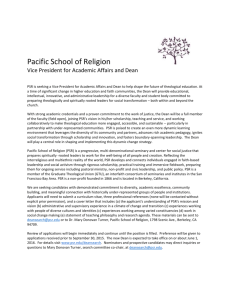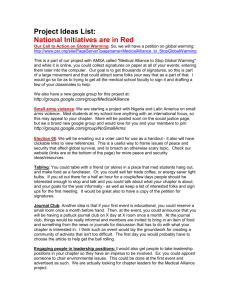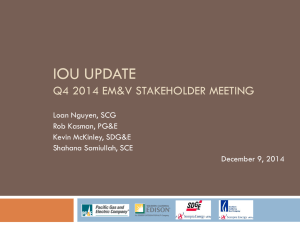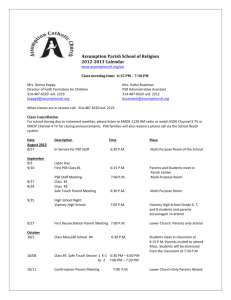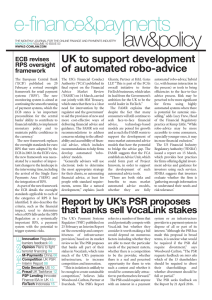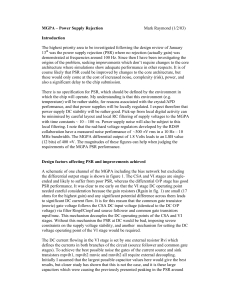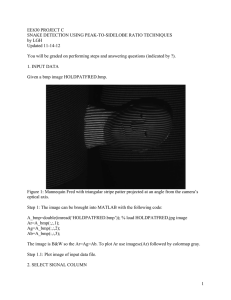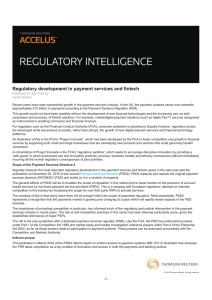Public Sector Management Capacity
advertisement
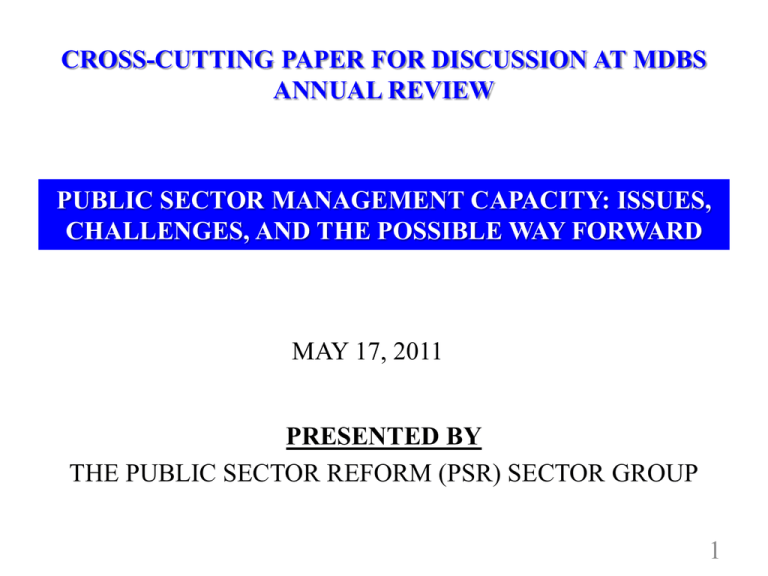
CROSS-CUTTING PAPER FOR DISCUSSION AT MDBS ANNUAL REVIEW PUBLIC SECTOR MANAGEMENT CAPACITY: ISSUES, CHALLENGES, AND THE POSSIBLE WAY FORWARD MAY 17, 2011 PRESENTED BY THE PUBLIC SECTOR REFORM (PSR) SECTOR GROUP 1 PURPOSE • Stimulate discussion • Build shared understanding of issues • Point to practical steps 2 OUTLINE OF PRESENTATION • • • • • • • • Theorists and practitioners Challenges in Ghana: capacity implications Responding to the challenges: promising initiatives Key issue: need for strategic coordination Strategic human resources management Suggested actions Strategic coordination as key element of PSR Bigger questions 3 FRAMEWORK: BROAD CHALLENGES OF PUBLIC SECTOR MANAGEMENT CAPACITY • Institutional capacity • Organizational capacity • Anticipative capacity • Adaptive and innovative capacity 4 PRACTITIONERS’ PERSPECTIVE • Organizational change • Roles, responsibilities, relationships, accountabilities • Diagnosed and driven from within the organization itself • Leaders, champions, people carrying out the work 5 CHALLENGES IN GHANA: A FEW EXAMPLES • Middle income status • Producer of oil and gas • Decentralized governance 6 WHAT THE CHALLENGES MEAN • Institutional capacities: policies • Organizational capacities: service delivery, accountabilities • Anticipative, adaptive, innovative: global trade and finance management of resources social policies public-private partnerships 7 RESPONDING TO THE CHALLENGES AT THE CONCRETE LEVEL: PROMISING INITIATIVES • Sector Strategic Development Plan, Water and Sanitation • Decentralization, decoupling “roadmap” • Central management agencies rethinking roles, relationships • New Approach to PSR 8 KEY ISSUE: NEED FOR STRATEGIC COORDINATION AND COLLABORATION • Linkage decentralization-PSR: inter-Ministerial coordination from Ministers’ level to public service managers’ level • New Approach: political accountability: translated into roles, relationships, accountabilities at public service managers’ level 9 STRATEGIC HUMAN RESOURCES MANAGEMENT • Where and how capacity actually “happens” • Key area for strategic action and coordination • Broad policy questions: size and profile of public service • Skill needs of 21st century: “knowledge workers”, policy, planning, M&E • Re-thinking classification system? • PFM reforms, HR specialization 10 SUGGESTED ACTION: TOOLS TO SUPPORT COORDINATED, STRATEGIC HUMAN RESOURCES MANAGEMENT 1. COMPREHENSIVE HUMAN RESOURCES DATABASE essential for HR policy, planning, deployment, recruitment, development, career progression, succession planning while each central management agency and Ministry has its own needs, one comprehensive interlinked needed for overall effective strategic coordination Public Services Commission has initiated work with Kofi Annan Centre, NITA; to be further developed in collaboration with other central management agencies PSR Sector Group has proposed as target for new PAF; good consensus by Government/DPs that this is constructive step forward. WHAT’S NEEDED: clear central commitment from Government to support development of this essential tool for strategic HR management as a step in PSR, to catalyse continued collaboration of agencies and DPs towards a concrete result. 11 SUGGESTED ACTION: TOOLS TO SUPPORT COORDINATED, STRATEGIC HUMAN RESOURCES MANAGEMENT 2. CAPACITY DEVELOPMENT MECHANISM potential new Government of Ghana mechanism to help set strategic priorities and coordinate capacity development across public sector would be undertaken as a pilot – “learn by doing” in managing initial modest seed fund design phase: governance structure, priority-setting process, criteria for proposals, decisiopn-making, monitoring, reporting on results could eventually attract funds from both central budget and DP sources, for harmonized, strategically managed cross-government capacity development; WHAT’S NEEDED: active participation by key stakeholders in Design Steering Committee; clear commitment and ownership by Government as a cross-agency, cross-sector priority setting and strategic coordination mechanism 12 SUGGESTED ACTION: TOOLS TO SUPPORT COORDINATED, STRATEGIC HUMAN RESOURCES MANAGEMENT 3. PERFORMANCE MANAGEMENT SYSTEM cornerstone to public sector accountability for results key to institutional, organizational, adaptive, innovative capacity highlighted as issue in New Approach, Ghana Shared Growth and Development Agenda, implementation of pay policy, decentralization Public Services Commission engaging other agencies in its work on performance management, but no clear central policy decision for comprehensive performance management system as part of coordinated approach to PSR WHAT IS NEEDED: clear central policy decision, tasking lead agency and key actors to come together, move process forward in collaborative coordinated way as a key element in PSR. 13 STRATEGIC COORDINATION OF PUBLIC SECTOR MANAGEMENT CAPACITY AS KEY ELEMENT OF PUBLIC SECTOR REFORM • Main recommendation of PSR Sector Group • Adopt as policy key concrete actions: mobilize actors, leads, goals, timelines to results for each of the suggested actions above • Consider where, who, and how, especially to bring together central management agencies: e.g. Chief Executives Forum, Chief Directors Forum, Ad-Hoc Meetings on Strategic Issues • Role of PSR Secretariat in coordinating decisions and action plans for reforms overall? 14 BIGGER QUESTION: RETHINKING, REVIEWING STRUCTURES, MANDATES, ROLES, RELATIONSHIPS • While shorter term actions proposed to move forward in context of existing institutions, bigger questions for longer term. • Re-thinking, reviewing existing structures which have been in place for many years; are these what are needed as Ghana moves through transition and into middle income status? • Mandates, roles, relationships of central management agencies, MDAs, local government structures in strategic policy coordination and service delivery: are these effective in institutional, organizational, and especially adaptive and innovative capacity? 15

